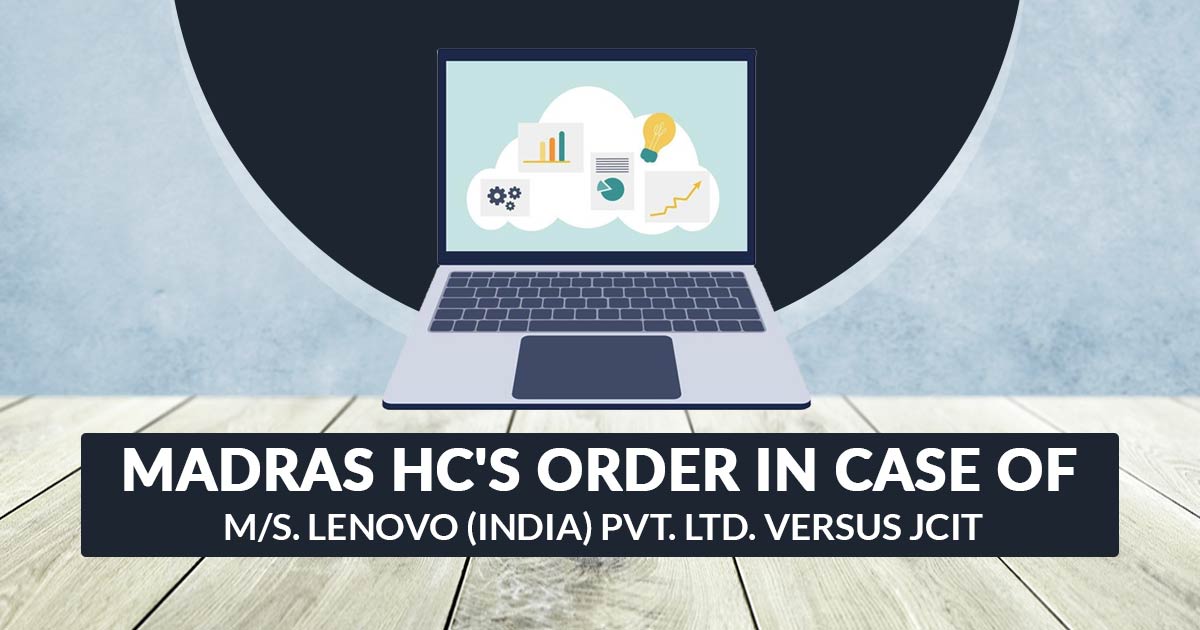
The Madras High Court ruled that the two-year limitation for filing the GST refund application is a directory and not obligatory. The Justice Krishnan Ramasamy bench noted that Section 54(1) of the CGST Act allows applicants to submit their applications within two years from the relevant date, suggesting it as an option rather than a strict requirement.
This flexibility implies that in some cases, refund applications might be accepted even after the two-year timeframe, indicating that the set time limit is more of a guideline and not an absolute obligation.
Consequently, legitimate refund claims by the applicant cannot necessarily be rejected solely based on surpassing this two-year period in certain appropriate cases.
The petitioner, Lenovo (India) Pvt. Ltd., operates within the computer manufacturing and importing domain, providing these products along with related services to Special Economic Zones (SEZ units).
GST Under Section 16 of the Integrated Goods and Services Tax Act, 2017 (IGST Act), transactions involving the export and supply of goods or services to SEZ units or developers are deemed as zero-rated supplies, meaning no tax is levied on such transactions.
To seek a refund for the IGST they had paid, the petitioner submitted applications under Section 16 of the IGST Act, in conjunction with Section 54 of the Central Goods and Services Tax Act, 2017 (CGST Act), and Rule 89 of the CGST Rules, 2017.
However, the respondent or department has partially rejected the petitioner’s applications. Upon appeal before the Appellate Authority, this decision was upheld.
The petitioner clarified that they function as a Domestic Tariff Unit (DTA Unit), facilitating the supply of goods and services to SEZ units during December 2019, January 2020, and February 2020.
Seeking refunds, the petitioner submitted applications via the GSTN Portal, inclusive of the necessary declarations, undertakings, and Statement-4, alongside copies of tax invoices endorsed by authorized officers within the respective SEZs. Despite this, the department dismissed the applications.
The rejection stemmed from inaccuracies in the mentioned endorsement dates within Statement 4, allegedly used to mask a considerable delay in obtaining endorsements from the authorized officer or specified officer (AO/SO).
The delay, stated to be unrelated to the pandemic, as the lockdown only commenced in March 2020, renders the Revised Statement-4 submitted inadmissible due to exceeding the time limit.
Related:- Madras HC Orders Goods’ Buyer to Deposit 200% Penalty for Illegal GST ITC
The petitioner argued that the application’s rejection, based on the endorsement not explicitly confirming full admission of goods for authorized operations, is unjustifiable.
They emphasized that the endorsement merely acknowledges the receipt of goods in full, which, according to the department, is insufficient to support the claim’s rejection.
Furthermore, the petitioner asserted that a refund claim should not be dismissed as long as it falls within the specified time limit of 2 years, as outlined in Section 54(1) of the CGST Act.
They highlighted that any delay in submitting supporting documents during the reply or personal hearing stage should only extend the time frame for passing an order under Section 54(7) of the CGST Act.
Additionally, they argued that the absence of certain documents at the time of refund application filing shouldn’t imply a delay in the application itself.
Contrarily, the department argued that the rejection of the refund claim for December 2019 resulted from discrepancies in the details provided in Statement 4.
The dates of endorsement in the invoices differed from those mentioned in Statement 4. Despite the submission of a revised Statement-4, its delayed filing led to the rejection of the claim based on time limitations.
The court deemed the rejection of the petitioner’s claim, based on the endorsement lacking specific confirmation of goods being fully admitted for authorized operations, as invalid.
Read Also:- Issue A GST Number Within 7 Days, Madras High Court Grants Relief To Assessee
The court found the department’s reasoning regarding the denial of the claim due to delayed endorsement or its alleged inadequacy to be unsubstantiated. Therefore, the findings by the respondent department on these grounds were overturned.
Addressing the issue of making a claim beyond two years, the court clarified that even if an endorsement were made by the AO after this period, it wouldn’t restrict the claim as time-barred.
Additionally, Rule 90(3) of the CGST Act allows for a fresh application, implying that in suitable instances, the officer in charge can approve a refund application even after the limitation period.
| Case Title | M/s. Lenovo (India) Pvt. Ltd. Versus JCIT |
| Citation | W.P.Nos.23604, 23605 and 23607 of 2022 |
| Date | 06.11.2023 |
| Counsel For Petitioner | Raghavan Ramabadran |
| Counsel For Respondent | Hemalatha |
| Madras High Court | Read Order |









